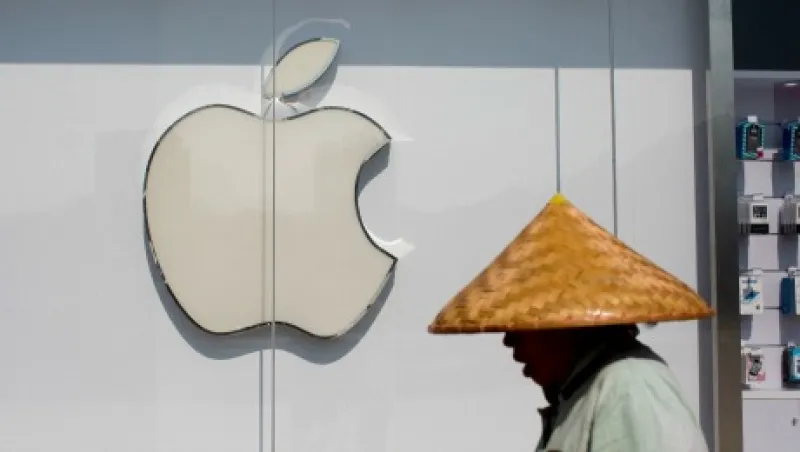Corporate earnings announcements take the back seat to macro developments this morning as investors focus on new language from the Federal Reserve. The general consensus among bond investors is that the Federal Open Market Committee release today will not include substantive language changes. One outlier possibility being discussed by Fed watchers, however, is a potential modification in discussions of “market-based measures of inflation.” In acknowledging recent declines in wages and depressed oil prices, FOMC members could back away from the Federal Reserve’s 2 percent inflation expectations. It is important to note that, with no press conference to accompany today’s release, the full mood of the policymakers will not be known until the meeting notes are released. With valuations already extended to near-historic highs in the Treasury market, however, most strategists continue to urge caution on outright bullish exposures as “considerable time” still appears to have run out.
Apple gives the market a nice surprise. From a market sentiment standpoint, after a series of downbeat earnings announcements by major U.S. companies, a tremendous amount rode on Apple’s earnings announcement yesterday afternoon. With a record $18 billion in fourth quarter earnings — $3.06 per share, almost a full 20 percent higher than consensus estimates — the consumer tech giant didn’t disappoint. Powered by the sale of 74.5 million iPhones, Apple handily beat expectations despite the macro headwinds facing all global consumer companies.
Australian inflation drops. According to data released today by the Australian Bureau of Statistics, the consumer price index grew just 0.2 percent in the fourth quarter of 2014, finishing at 1.7 percent for the year, the first time in over two years that Australia’s annual pace of headline consumer inflation index levels registered below 2 percent. With low fuels costs helping to mute prices, many analysts now see the potential for further intervention by Reserve Bank of Australia policymakers.
Wynn to announce earnings as Macau concerns mount. Wynn Resorts will release earnings results for the fourth quarter this afternoon after the close of U.S. trading. The company’s share price has fallen by more than 25 percent since the Chinese government began a high profile crackdown on corruption with a focus on the nation’s gambling mecca of Macau. Wynn’s sales for the third quarter fell by 6 percent, driven by lower receipts at Chinese locations, and analyst are predicting a further decline. Last week, in a filing with the Securities Exchange Commission, the company announced a pay cut for CEO Steve Wynn.
Shell expands in Iraq. Today’s announcement by Royal Dutch Shell that it has agreed to an $11 billion investment in Iraq for a new petrochemicals facility indicates that major energy companies are continuing to expand capacity selectively despite the collapse in the price of oil. The proposed Nibras complex in Basra will be the largest facility of its type in the Middle East according to the Iraq Industry Minister Nasser al-Esawi.
Greek leaders stir controversy in the EU. Only days into a new administration, the Syriza party’s cabinet leaders have called for an increase in the nation’s minimum wage and abandoned existing plans to sells a majority interest in the Port of Piraeus. In a further provocation of European leadership, the newly installed government in Athens responded to a EU statement threatening further sanctions against Russia by insisting that more actions would be impossible without Greek consent, which it intends to withhold.
Portfolio Perspective: Quantitative Easing is Good for Stocks But Unlikely to Cure Europe’s Economic Ailments — Michael Passante, Focused Wealth Management
After months of speculation, the European Central Bank unveiled a €60 billion monthly quantitative easing program in effect through September 2016. Europe needs QE to pull itself out of perpetual recession. While it should lift the stock markets, it will not likely achieve the ECB’s 2 percent inflation target. A fair comparison is the Bank of Japan’s stimulus program the past few years. The BoJ expanded its balance sheet by trillions of dollars. That boosted Japan’s stock market but failed to juice inflation. The Federal Reserve’s QE drove the U.S. stock market higher but inflation dropped substantially after the bond-buying program ended in October 2014 owing to free-falling commodities prices and a strengthening greenback. Because all commodities are traded globally in dollars, any U.S. QE program will have a greater impact on inflation globally than that of any other major central bank.
Quantitative easing will improve investor and business sentiment but it’s unlikely to solve all of Europe’s economic problems. The success of the ECB’s QE program rests with the European banking system, which unfortunately is highly leveraged on top of being riddled with poor balance sheets and capitalization ratios compared to U.S. banks. Europe has yet to see loan growth or central bank money trickle into the economy. If the ECB’s QE program helps banks improve their balance sheets, it’s a step in the right direction.
On the bright side, a weak euro should lift demand for European exports and tourism. At the same time plunging gas prices should boost consumer spending. The euro will likely weaken more, dampening the risk of deflation. Interest rates will stay low for the foreseeable future and demand for credit will continue to perk up. If investors cannot earn anything on risk-free bonds, they’ll be forced into the stock market.
Michael Passante is a portfolio manager at Focused Wealth Management, a registered investment advisory firm in Highland, New York.






